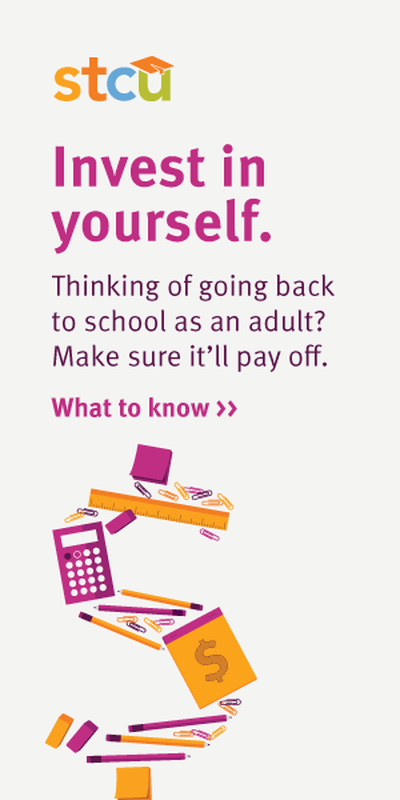Invest in yourself

Thinking of going back to school? Make sure it’ll pay off.
Deciding to go back to school as an adult can bring significant rewards, including increased job opportunities and earning potential. It’s an investment in your future, but — as with any investment — there are costs involved.
Do your research. “Before you decide to go back to school, decide if it’s worth it,” says Jodi Brant, an education attainment navigator with Greater Minds, an initiative of Greater Spokane Inc. that helps working adults return to school. “Research typical salaries and whether it’s a field that’s expected to grow.”
Evaluate your options. As you compare schools, make sure you’re comparing apples to apples. Tuition per credit will be very different at a school that uses quarters v. semesters, for instance.
“Also, consider the other costs associated with going back to school, including books, fees and transportation. Schools will list the cost of attendance on their websites,” Brant said.
Get financing. Going back to school is expensive. Depending on circumstances, students can use a mix of funding sources, including grants, scholarships, loans, and personal savings.
Grants, like the federal Pell Grant and the Washington College Grant, provide need-based support that doesn’t need to be repaid.
The most important thing about loans: “Don’t take more than what you actually need,” Brant says.
Applying for scholarships can be like a part-time job. “A lot of times individuals get frustrated if they don’t immediately find the scholarship dollars,” Brant says. However, many scholarships are not awarded each year because students don’t apply for them.
If you’re involved with community groups, volunteer organizations, or a church, check out their national affiliate to see if they offer scholarships. There are also search engines to help students find opportunities, such as washboard.org, myscholly.com and unigo.com.
Both federal and private student loans are available, but federal loans are usually the best option, Brant said. To qualify, students must submit the Free Application for Federal Student Aid, or FAFSA.
Federal loans usually give students six months after graduation until repayment begins. The most important thing about loans: “Don’t take more than what you actually need,” Brant says. “If you’re offered $8,000, but only need $4,500, just take the $4,500.”
Another option to pursue is employer tuition assistance. Workplaces will often help pay tuition for employees going back to school. “There may be an application process and certain requirements for eligibility, though,” Brant says.
Greater Minds has a resource page to help returning students find financial options at greatermindsspokane.org/resources.
Avoid scams. “Whenever money is involved there’s always the chance for fraud. Never pay for scholarship applications or to submit your FAFSA,” Brant says. If someone’s offering free money you didn’t apply for, be skeptical.